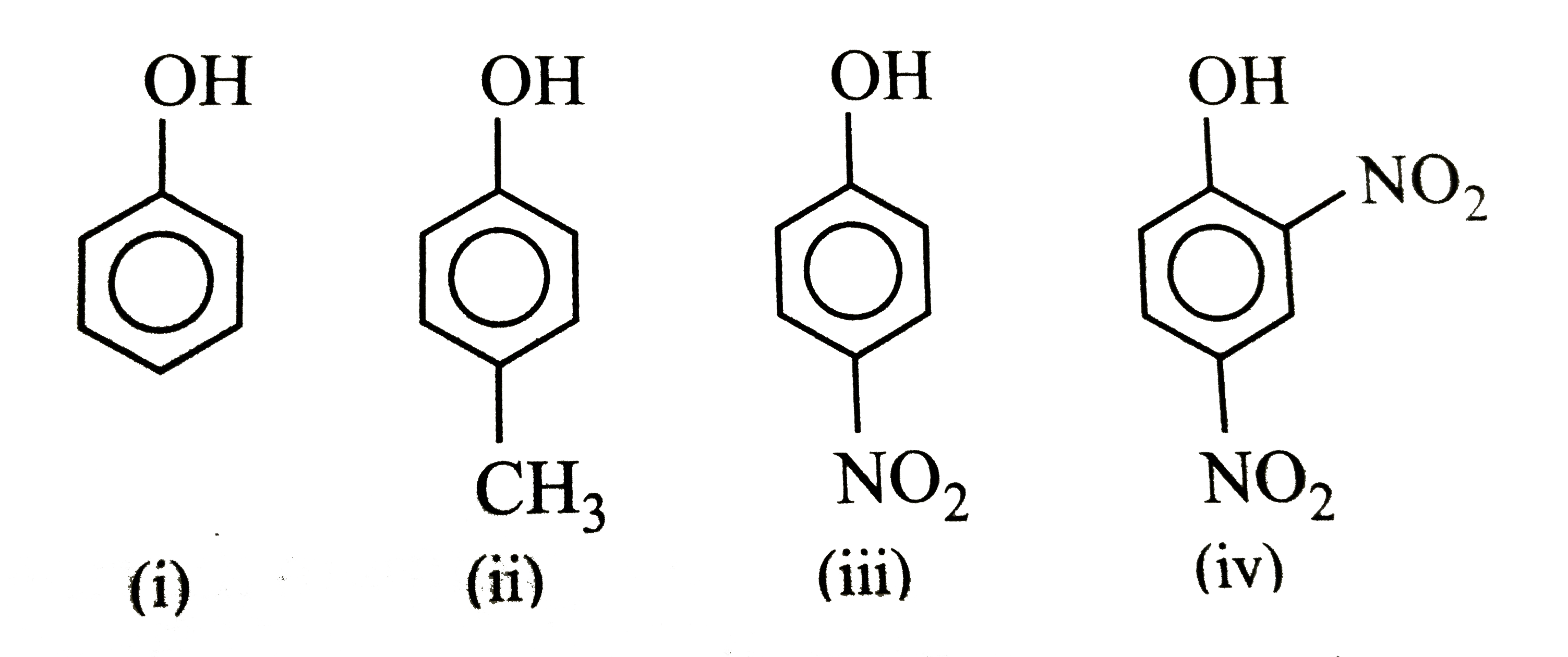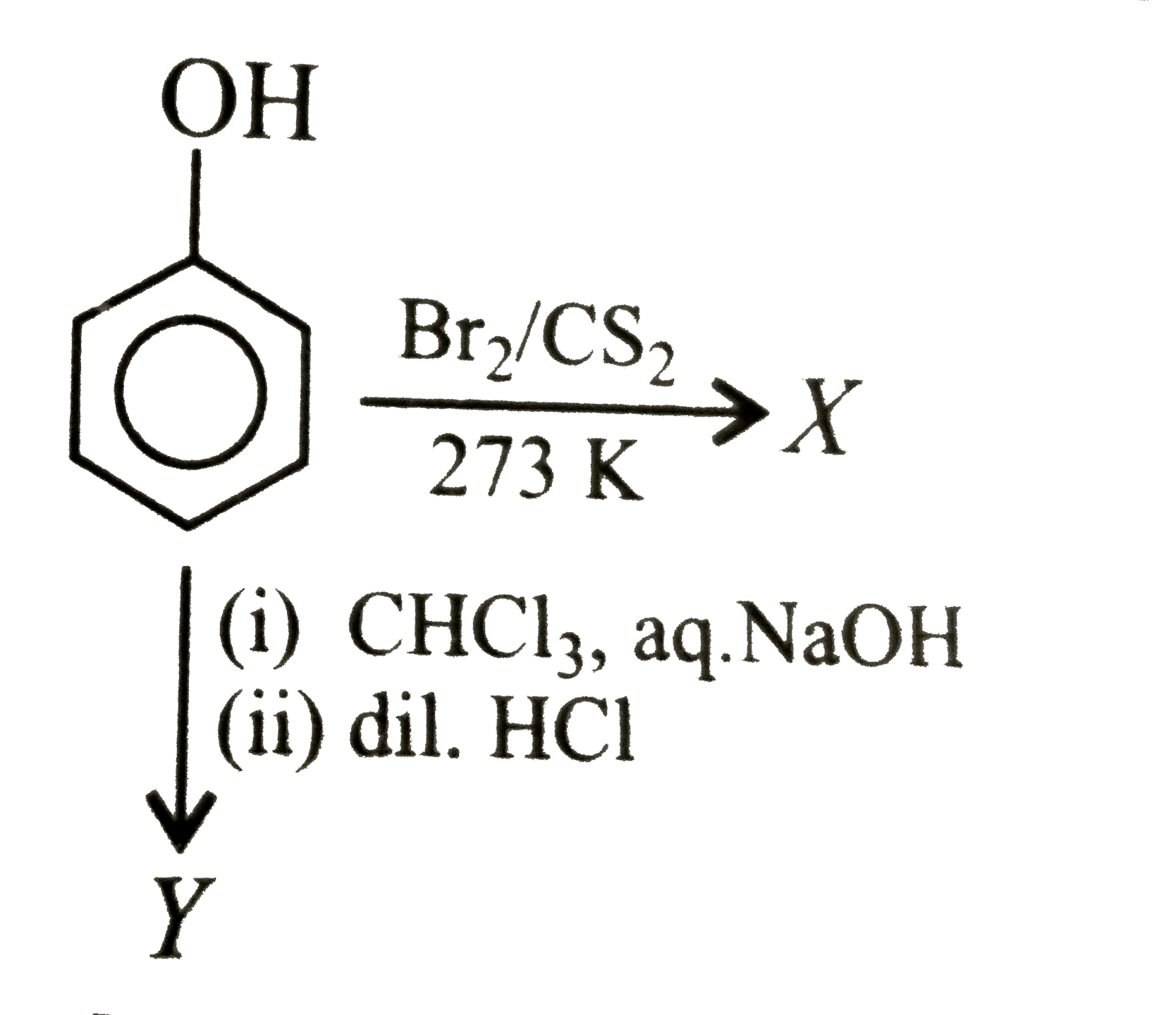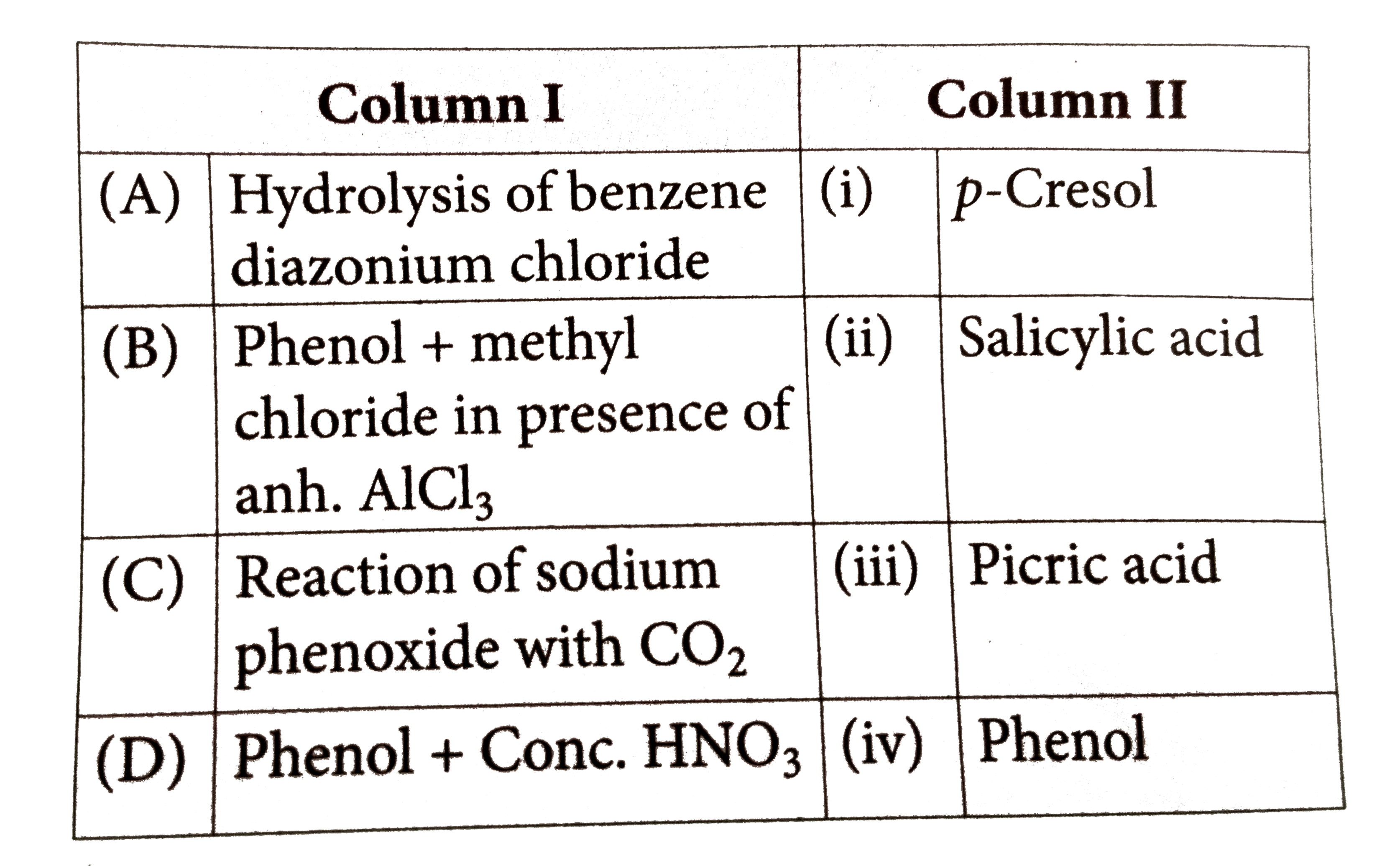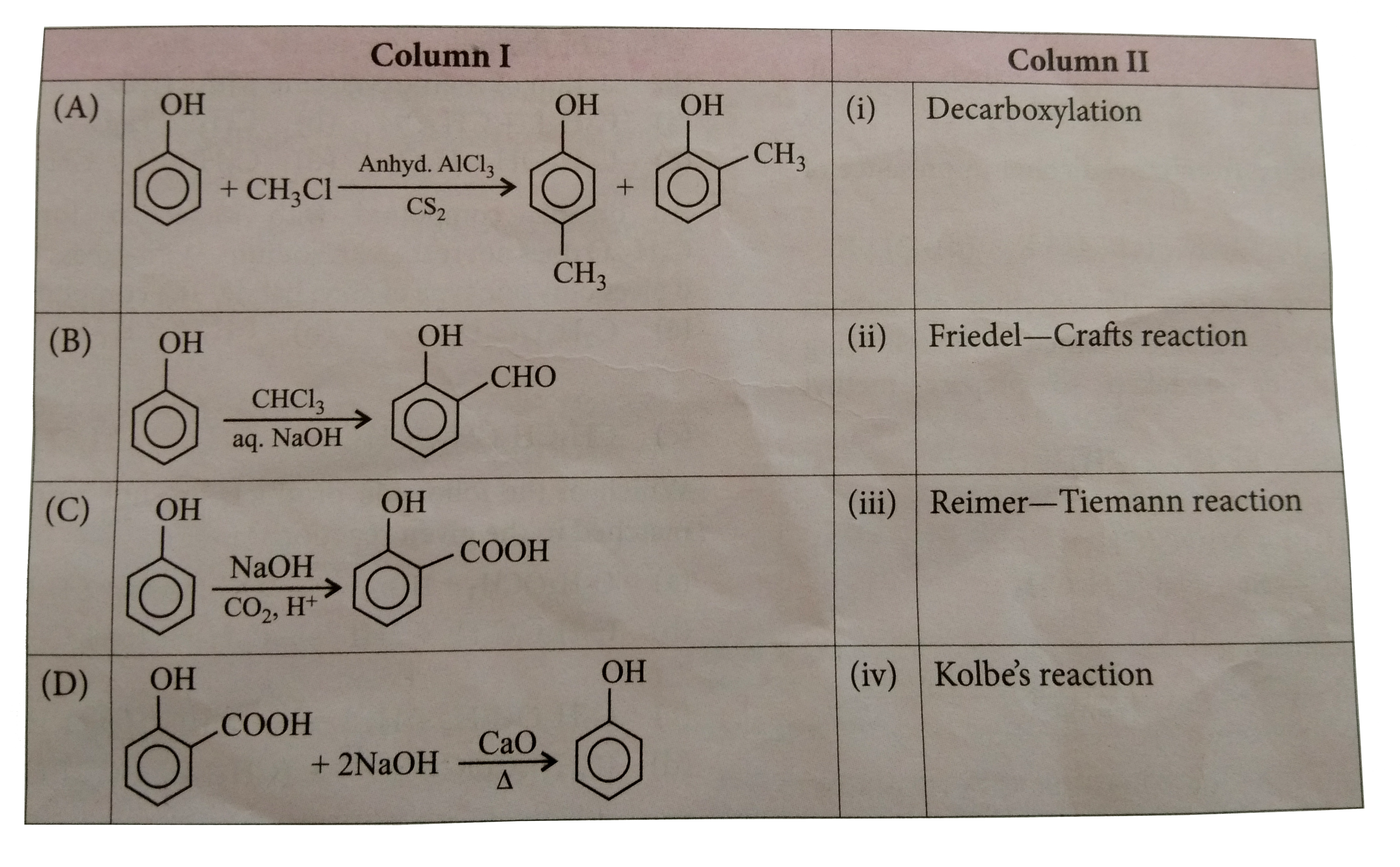Complete Solutions to Alcohols And Phenols of chapter ALCOHOLS,PHENOLS AND ETHERS of Class 12 book with complete answers and questions
| Class 12 | CHEMISTRY |
| Chapter | ALCOHOLS,PHENOLS AND ETHERS |
| NCERT FINGERTIPS | Alcohols And Phenols |
| Number Of Questions | 68 |
| Academic Year | 2023-24 |
The best method to prepare 3-methylbutane-2-ol from 3-methylbut-1-ene is
View SolutionAn alkene `CH_(3)CH = CH_(2)` is treated with `B_(2)H_(6)` in presence of `H_(2)O_(2)` . The final product formed is
View SolutionChoose the correct X and Y in the given reactions .

`CH_(3)CH_(2) underset(CH_(3))underset(|)(C)H- CHO overset(NaBH_(4))(to)(Y)`
View SolutionWhich reducing agent is used for the following conversion ?
`RCO OH to RCH_(2)OH`
View SolutionOne mole of ethly acetate on treatment with an excess of `LiAlH_(4)` in dry ether and subsequent acidification produces
View SolutionTertiary butyl alcohol can be prepared by the reaction of
View Solution1-Phenylethanol can be prepared by the reaction of benzaldehyde with the product obtained in the reaction between :
View SolutionWhat would be the reactant and reagent used to obtain 2,4 - dimethylpentan-3-ol ?
View SolutionReaction of propanone with methylmagnesium bromide followed by hydrolysis gives :-
View SolutionComplete the missing links .
`A overset(CH_(3) MgBr)(to) B overset(H_(3)O^(+))(to) C`
View SolutionIn the following sequence of reactions ,

the compound Q formed will be
View SolutionCumene on reaction with oxygen followed by hydrolysis gives
View SolutionWhich of the following reactions will not yield phenol ?
View SolutionThe decreasing order of boiling points of the following alcohols is
View SolutionWhich of the following statements is not correctly showing the trend of the properties mentioned ?
View SolutionArrange the following compounds in increasing order of boiling point :
Prpane-1-ol, butan-1-ol, butan-2-ol, pentan-1-ol
View SolutionWhich of the following is not characteristic of alcohols?
View SolutionOrtho -nitrophenol is less soluble in water than `p`-and `m-`nitrophenols because
View SolutionUnlike phenol , 2,4-dinitrophenol is soluble in sodium carbonate solution in water because
View SolutionIn reaction `C_(2)H_(5)OH+Hxoverset(ZnX_(2))rarrC_(2)H_(5)X+H_(2)O` the order of reactivity of HX is :
View SolutionWhich of the following is the proper method to prepare n-hexane from n-propyl alcohol ?
`CH_(3)CH_(2)CH_(2) OH overset((X))(to) CH_(3) CH_(2) CH_2 Br overset((Y))(to) CH_(3)(CH_(2))_(4)CH_(3)`
View SolutionArrange the following alcohols in order of increasing reactivity towards sodium metal .
`(CH_(3))_(3) C- OH (ii) (CH_(3))_(2) CH - OH`
`CH_(3)CH_(2)OH`
View SolutionWhich of the following compounds does not react with NaOH ?
View SolutionOut of 2-chloroethanol and ethanol which is more acidic and why ?
View SolutionWhich of the following options shows the correct order of decreasing acidity:
View SolutionThe correct order of strength of acidity of the following compounds is

View SolutionP-nitrophenol is a stronger acid than phenol while p-cresol is a weaker acid. Discuss.
View SolutionIn esterfication reaction rate for different alcohols
View SolutionAn unknown alcohol is treated with the 'Lucas reagent' to determine whether the alcohol is primary, secondary or tertairy. Which alcohol reacts faster and by what mechanism?
View SolutionWhich of the following compounds reacts immediately with Lucas reagent ?
View SolutionTertiary butyl alcohol gives tertiary butyl chloride on treatement with
View Solution`R-OH + HX to R -X + H_(2)O`
In the above reaction the reactivity of different alcohols is
View SolutionConsider the following reaction sequence ,
`CH_(3)CH(OH)CH_(3) overset("Conc" H_(2)SO_(4))underset("Heat")(to) X underset(H_(2)O) overset("dil." H_(2)SO_(4))(to) Y`
X and Y in the reaction respectively are
View SolutionWhich of the following alcohols will give the most stable carbocation during dehydration ?
View SolutionIn this reaction , `(CH_(3))_(3) C - CH_(2)OH overset("Conc." H_(2)SO_(4))underset(170^(@)C)(to) X`
X is
View SolutionAcid catalysed dehydration of t-butanol is faster than that of n-butanol because
View SolutionDehydration of the following in increasing order is

View SolutionAn alcohol of unknown structure gave a positive Lucas test in about five minutes. When alcohol was heated with concentrated `H_(2)SO_(4)` an alkene was formed with the formula `C_(4)H_(8)`. Ozonolysis of this alkene gave a single product, `C_(2)H_(4)O`. What was the structure of the alcohol ?
View SolutionThe major product of acid catalysed dehydration of 2-methylcyclohexanol and butan-1-ol are respectively
View SolutionWhich of the following alcohols on dehydration with conc. `H_(2)SO_(4)` will yield But-2-ene ?
View SolutionIn the following reactions `CH_3-overset(CH_3)overset(|)CH-underset(OH)underset(|)CH-CH_3overset(H^+//heat)rarrunderset([underset("product")"Major"])A+underset([underset("product")("Minor")])B`
(ii) `Aoverset("HBr, dark")underset("in absence of peroxide")rarrunderset([underset("product")"Mejor"])C+underset([underset("product")("Minor")])D`
The major products A and C are repectively
View SolutionAn alcohol X on heating with concentrated `H_(2)SO_(4)` gives an alkene Y which can show geometrical isomerism . The alcohol X is
View SolutionA compound X with moleuclar formula `C_(3)H_(8)O` can be oxidized to a compoud Y with the molecular formula `C_(3)H_(6)O_(2)`. X is most likely to be a:
View SolutionThe best reagent to convert pent-3-en-2-ol into pent-3-en-2-one is
View SolutionThe most suitable reagent for the conversion of `RCH_(2)OH`to`RCHO` is
View SolutionIn the following reaction sequence,
`CH_(3) - underset((X))underset(OH)underset(|)(C)H-CH_(3) overset([O])(to) Y overset(CH_(3)MgBr)underset(H^(+)// H_(2)O)(to) Z`
Z is
View SolutionConversion of ethyl alcohol into acetaldehyde is an example of
View SolutionWhen tertiary butyl alcohol is passed over reduced copper, the reaction taking placed is
View SolutionWhich of the following is not true in case of reaction with heated copper at `300^(@)C` ?
View SolutionWhen tertiary butyl alcohol is passed over reduced copper, the reaction taking placed is
View SolutionWhich of the following reagents can be used to oxidise primary alcohols to aldehydes ?
View SolutionWhich of the following compounds will be most easily attacked by an electrophile ?
View SolutionOut of phenol and benzene, which can be more easily nitrated ?
View SolutionPicric acid is a yellow coloured compound. Its chemical name is
View SolutionWhen phenol in treated with excess bromine water, it gives
View SolutionThe structure of the compound that gives a tribromo derivative on treatment with bromine water is `:`
View SolutionThe major product obtained on interaction of phenol with sodium hydroxide and carbon dioxide is :
View SolutionThe reaction between phenol and chloroform in the presence of aqueous NaOH is
View SolutionConversion of phenol to salicylic acid and to salicyaldehyde are known as (respectively)
View SolutionIn this given reactions,

X and Y are respectively
View SolutionIdentify the final product of the reaction sequence .

View SolutionBenzoquinone is prepared by reaction of phenol with
View SolutionWhich of the following statements is correct ?
View Solutionp-cresol reacts with chloroform in alkaline medium to give the compound A which adds hydrogen cyanide to form, the compound B. the latter on acidic hydrolysis gives chiral caboxylic acid. The structure of the carboxylic acid is
View SolutionA primary alcohol, `C_(3)H_(8)O(W)` on heating with sulphuric acid undergoes dehydration to give an alkene , (X), which reacts with HCl to give (Y). (Y) on treatment with aqueous KOH gives compound (Z),`C_(3)H_(8)O`. Compounds (W) and (Z) are `:`
View SolutionMatch the column I with column II and mark the appropriate choice .

View SolutionConsider the following reaction
Phenol `overset(Zn)underset("dust")rarr X overset(CH_(3)Cl)underset(underset(AlCl_(3))("Anhydrous"))rarr Y overset("Alkaline")underset(KMnO_(4))rarrZ`
The product Z is
View SolutionMatch the column I with column II and mark the appropriate choice .

View Solution
Alcohols And Phenols questions and complete solutions for chapter ALCOHOLS,PHENOLS AND ETHERS of MTG CHEMISTRY (ENGLISH) of Class 12